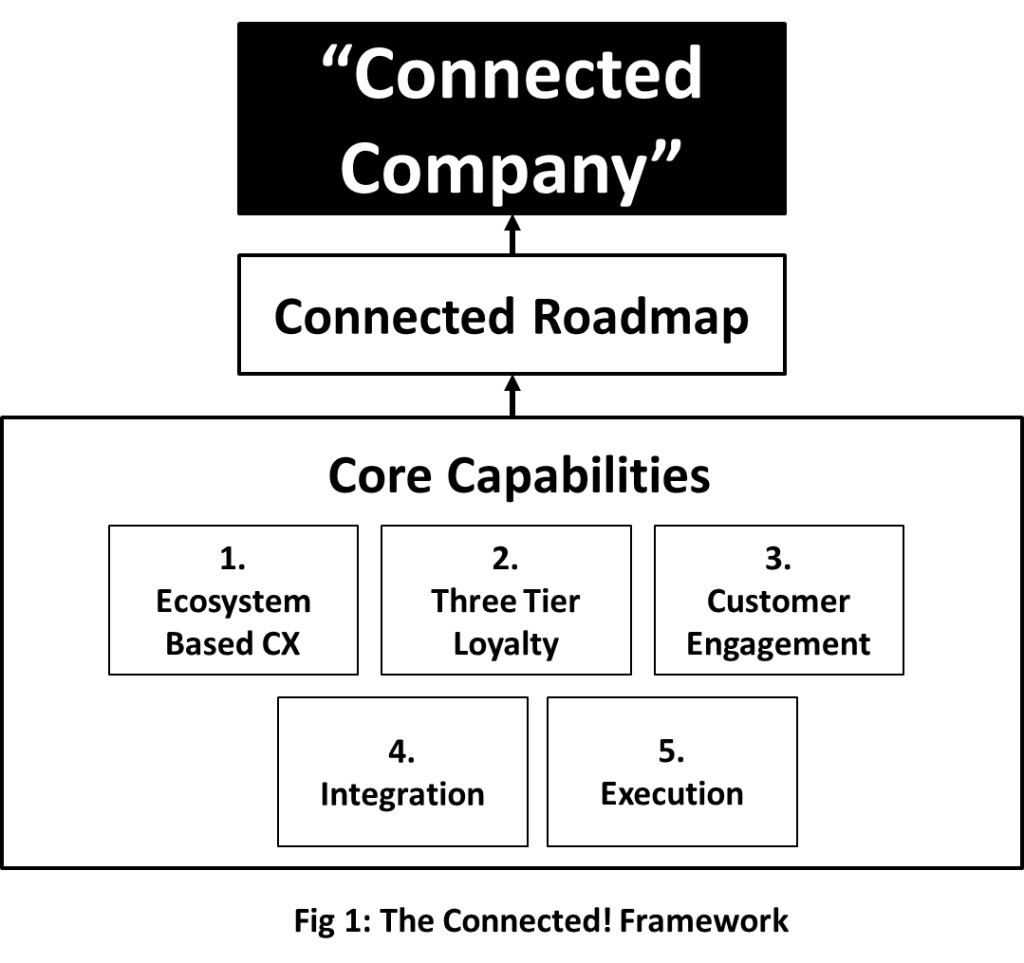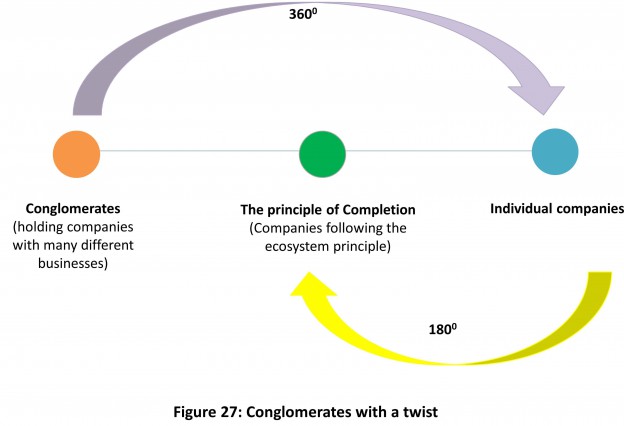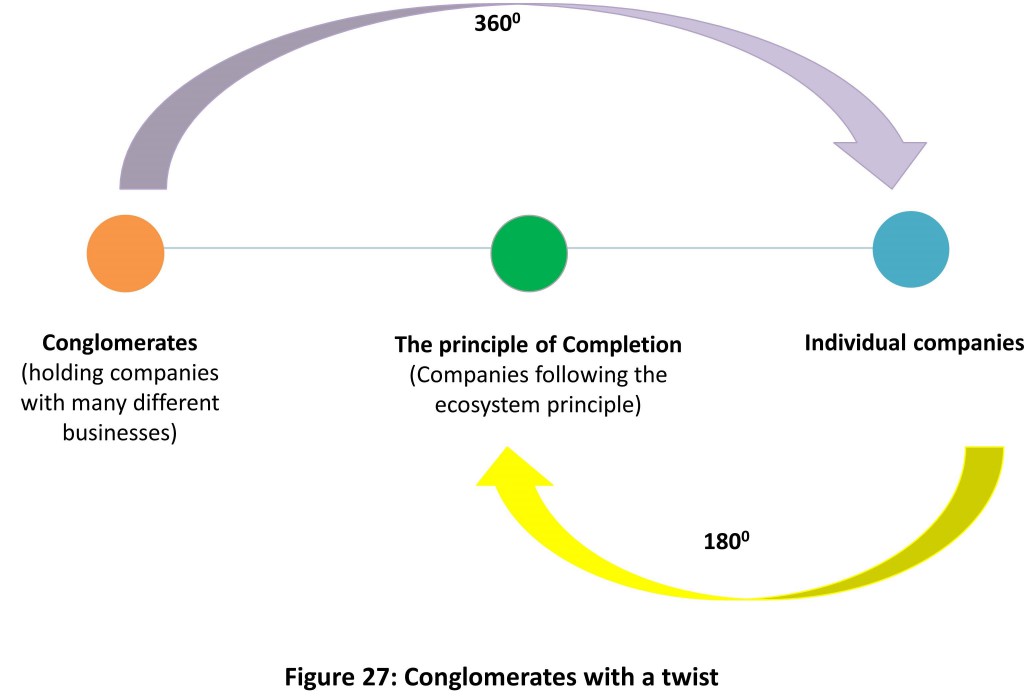Cross-industry collaboration must be interpreted in a dramatically different way today. That’s because the most noteworthy competitors in any industry today have among them several non-traditional players. These include upstarts who have started with simple, logical, online models and are now slowly expanding to gobble up adjacent sectors – Amazon, Airbnb, Alibaba, Uber, PayPal, WeChat to name a few. And then there are players rooted in the physical but building smart ecosystems – Costco, JP Morgan, Hyatt, WalMart to name a few.
It can be said that these new competitors are not traditional industry players – instead they are digital conglomerates focused on owning the customer. All of these are building the WalMart of the 21st century – only much more broader than imaginable.
A new definition for cross-industry collaboration is needed
The traditional definition of cross-industry collaboration is obsolete because it was about distribution, or supply chain benefits: different players of all kinds coming together to build a city, or complete an IoT platform, market a product, make a hardware product, or fill up a marketplace. There was one dominant player in the middle of this collaboration.
That’s why in “The red herring of Amazon and Physical Retail“, I outlined how the real battle is not at all about AI, big data, analytics, or being Omni Channel. Instead when we look past this red herring, we find that the real battle is about being a place where one can find almost anything, and about creating a loyalty program that knits together many different businesses.
However times have changed. And today the problem we want to solve is orders of magnitude more complex that just a more robust value chain. We must address cross-industry customer journeys to stay relevant which means the concept of the value chain itself must expand dramatically.
So the real conversation these days should be about upgrading our cross-industry collaboration and innovation models. But what is this collaboration we speak about – between who? And what kind of innovation?
To help illustrate this new definition of “cross-industry collaboration” better, I’ll use the story of The Paradise, a Netflix show. Stay with me for a minute! The story of The Paradise outlines how an enterprising young woman manages to bring together a diverse collection of main street stores in an effort to work together against Britain’s first department store – The Paradise. She orchestrates the creation of a common loyalty program, links their promotions, provides mechanisms to recommend each others’ goods, and engages in customer service as one entity so they can feed off each other. Unfortunately, the script writers doomed that model to fail in favor of a melodrama instead of an exciting business thriller. But not without leaving us with some very interesting lessons to think about for competing in today’s digital economy.
(source: The Principle of Completion – being a conglomerate without being one )
How the tables have turned
Fast forward a few decades from that setting, and we see that the model is being reversed in the online space. The protagonists are now innovators such as Amazon.com, while the aggressors of yesterday (aka The Paradise) are actors of the main street marketplace.
There is hope still. In recent years, some enterprising folks have created models that have the potential to be the backbone of tomorrow’s economy. The core concept is not new, but it now has the right backing of technology to propel it forward.
I’ll outline a few below to get your creative juices flowing on this kind of industry collaboration. If you thought Amazon Prime is difficult to reproduce think again!
- Shoprunner: This rapidly growing program links together about 140 businesses (as of last count) and provides free 2 day shipping and large discounts from member businesses. It’s unique because it brings on its platform multiple card issuers, card networks, and retailers. These member businesses also become sales engines of this program. The program is presently playing at the outside borders of what can be a true revolution. But it has the right foundations to become a future powerhouse of discovery and commerce – provided all parties can collaborate and play nice towards the grander vision. Right now, the program is basically trying to drive a lot of traffic to member retailers (in an affiliate like model) which can be a little frustrating for your inbox, but they are part of FedEx now. I’ll be watching this space as they further develop the tools for personalization and goals based selling, and expand the scope of their platform.
- Plenti: Conceived by American Express, this masterpiece (yes, I really do think that) was a true cross-industry loyalty program. It has brought together gas stations, retailers, pharmacies, restaurants and others as part of a program that very few thought would take off. It is indeed gratifying to punch in your phone number at a store, and see the savings miraculously appear on the receipt. That its owned and operated by American Express should be a trivial problem to solve for businesses looking to build the next generation marketplace. Plenti is largely still a payments based play but it’ll be interesting to see how this story unfolds in the areas of experiential commerce and lifestyle.
- Ebates: A few internet years ago, I considered this affiliate based marketing model as yet another 1 out of a 1,000,000 online locations to get deals and discounts. But in today’s context, this site (and others like it) have a special meaning because they show how they can provide a common thread that businesses need. There is much evolution to do still and that means plenty of potential for innovation and collaboration.
- Citi Bonus Cash Center: This at-the-time visionary affiliate based concept was a perfect Amazon of today, and still has the potential to be except that it is loosely built and focused on discounts much like Ebates is. But it is evidence that the model of the future is right there for an overarching cross-industry platform. The big difference from a traditional affilitate model is that being a platform owned by a large bank, it can deliver extreme personalization, integrated financial planning & benefits, along with being your One Drive of the future!
- Groupon and others: I think you are beginning to get the drift so I won’t belabor the point any more. On the other side of the world, you can also think about WeChat and Alibaba who are living up this marketplace model to the hilt.
Any model that can span cross-industry boundaries is a candidate for innovation in cross-industry collaboration. Much like the solution to the blockchain hype, the trick is in looking from the outside-in – at our business versus from our business. It’s also a call for reflection and action for those who haven’t pushed the boundaries of this new kind of cross-industry collaboration yet.
The models I’ve outlined are not just for distribution or supply chain anymore. Latest technology such as public API models (Application Programmer Interfaces) and blockchain allow us today to create partnerships without being a partner. But the technology has always existed to help us meet these emerging needs. What we need now is a willingness to look beyond the comfortable and immediate. The pace of business change is accelerating. Can we keep up?

I outlined The Connected Company in my latest book Connected! and you can get the principles straight to your inbox. An eBook is available FREE for download here.



Pingback: The Unique Advantages & Potential of AI & Web3 - Dancing The Digital Tune
Very well articulated Manish…the historical lines of every industry are blurred today and owning the customer will be the only key driver